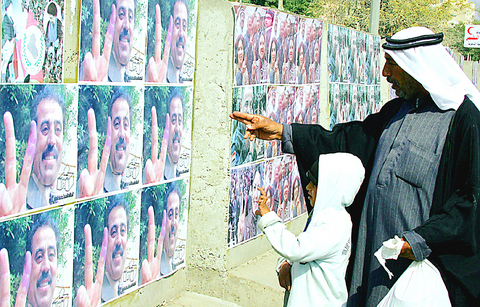A Shiite-dominated ticket won the Jan. 30 elections for the National Assembly, winning over 4 million votes -- or about 48 percent -- of the ballots cast, officials said Sunday.
A Kurdish alliance finished second with 2.175 million votes or 26 percent. The list led by US-backed Prime Minister Ayad Allawi won about 1.168 million votes -- or 13.8.

PHOTO: AFP
Officials said 8.456 million votes were distributed among the 111 candidate lists. More than 94,000 votes were declared invalid. Overall turnout was 58 percent.
The results indicate the Shiites will have to form alliances within the National Assembly to push through their agenda and select a president and prime minister. The president and two vice presidents must be elected by a two-thirds majority.
Earlier, the head of the Shiite party, Abdul-Aziz al-Hakim, had predicted his United Iraqi Alliance would win over 60 percent of the vote.
However, the results point to a major victory for the country's long oppressed Shiite majority, oppressed under Saddam Hussein and deprived of national power since the establishment of the modern Iraqi state after World War I.
The figures also indicate that many Sunni Arabs stayed at home on election day -- with only 17,893 votes -- or two percent -- cast in Anbar province in the National Assembly race, a stronghold of the Sunni Muslim insurgency.
In Ninevah province, which includes the third largest city Mosul, only 17 percent of the voters participated in the National Assembly race and 14 percent voted in the provincial council contests.
A ticket headed by the country's president Ghazi al-Yawer, a Sunni Arab, won only about 150,000 votes -- less than 2 percent. A list headed by Sunni elder statesman Adnan Pachachi took only 12,000 votes -- or 0.1 percent.
The election commission said parties have three days to lodge complaints before the results are considered official. Officials said they would be unable to determine exactly how many seats each ticket won until after the count is finalized after three days.
Pachachi told Al-Arabiya television that it was clear that "a big number of Iraqis" didn't take part in the election and "there are a some who are not correctly and adequately represented in the National Assembly," meaning his fellow Sunni Arabs.
"However, the elections are correct and a first step and we should concentrate our attention to drafting the constitution which should be written by all Iraqi factions in preparation for wider elections."
MORE BLOODSHED
The bodies of two men who worked with Allawi's party were found in a rebellious district of Baghdad yesterday, police said. In the northwest of the capital, gunmen assassinated two senior Iraqi army officers and their driver. The al-Qaeda network in Iraq claimed responsibility for the attack.
In the town of Baquba northeast of Baghdad, assailants shot dead a Communist party member who was also a local councillor.
In Mosul, a rocket attack on the city hall building killed at least two people, hospital officials said.
On Saturday, a suicide car bomb killed 18 people in Musayyib, a mixed Sunni and Shiite town south of Baghdad

MAKING WAVES: China’s maritime militia could become a nontraditional threat in war, clogging up shipping lanes to prevent US or Japanese intervention, a report said About 1,900 Chinese ships flying flags of convenience and fishing vessels that participated in China’s military exercises around Taiwan last month and in January last year have been listed for monitoring, Coast Guard Administration (CGA) Deputy Director-General Hsieh Ching-chin (謝慶欽) said yesterday. Following amendments to the Commercial Port Act (商港法) and the Law of Ships (船舶法) last month, the CGA can designate possible berthing areas or deny ports of call for vessels suspected of loitering around areas where undersea cables can be accessed, Oceans Affairs Council Minister Kuan Bi-ling (管碧玲) said. The list of suspected ships, originally 300, had risen to about

DAREDEVIL: Honnold said it had always been a dream of his to climb Taipei 101, while a Netflix producer said the skyscraper was ‘a real icon of this country’ US climber Alex Honnold yesterday took on Taiwan’s tallest building, becoming the first person to scale Taipei 101 without a rope, harness or safety net. Hundreds of spectators gathered at the base of the 101-story skyscraper to watch Honnold, 40, embark on his daredevil feat, which was also broadcast live on Netflix. Dressed in a red T-shirt and yellow custom-made climbing shoes, Honnold swiftly moved up the southeast face of the glass and steel building. At one point, he stepped onto a platform midway up to wave down at fans and onlookers who were taking photos. People watching from inside

Japan’s strategic alliance with the US would collapse if Tokyo were to turn away from a conflict in Taiwan, Japanese Prime Minister Sanae Takaichi said yesterday, but distanced herself from previous comments that suggested a possible military response in such an event. Takaichi expressed her latest views on a nationally broadcast TV program late on Monday, where an opposition party leader criticized her for igniting tensions with China with the earlier remarks. Ties between Japan and China have sunk to the worst level in years after Takaichi said in November that a hypothetical Chinese attack on Taiwan could bring about a Japanese

The WHO ignored early COVID-19 warnings from Taiwan, US Deputy Secretary of Health and Human Services Jim O’Neill said on Friday, as part of justification for Washington withdrawing from the global health body. US Secretary of State Marco Rubio on Thursday said that the US was pulling out of the UN agency, as it failed to fulfill its responsibilities during the COVID-19 pandemic. The WHO “ignored early COVID warnings from Taiwan in 2019 by pretending Taiwan did not exist, O’Neill wrote on X on Friday, Taiwan time. “It ignored rigorous science and promoted lockdowns.” The US will “continue international coordination on infectious